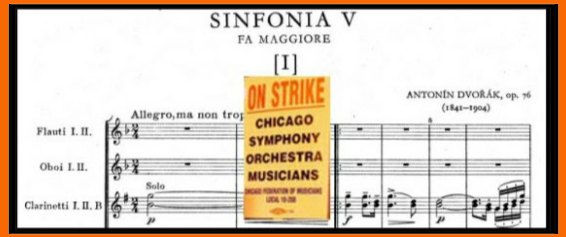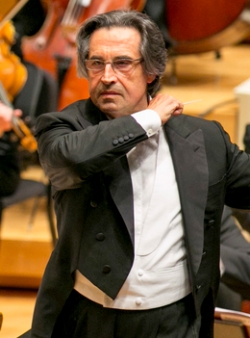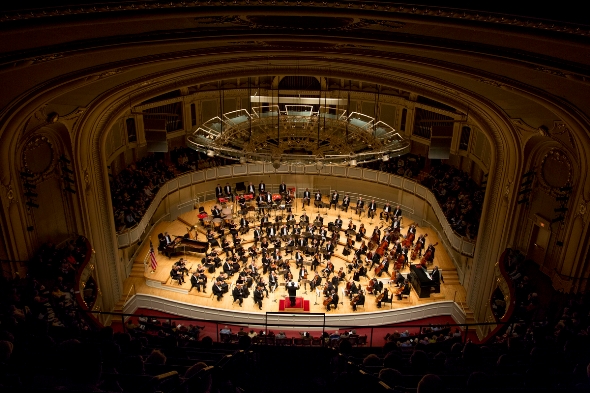As CSO contract talks break down, musicians’ strike forces last-minute concert cancellation
 MONDAY MORNING UPDATE: Talks between the Chicago Symphony Orchestra Association, the Chicago Federation of Musicians and a federal mediator will resume this afternoon, the CSO reports. The union states that musicians’ share of health care cost is an obstacle to settlement.
MONDAY MORNING UPDATE: Talks between the Chicago Symphony Orchestra Association, the Chicago Federation of Musicians and a federal mediator will resume this afternoon, the CSO reports. The union states that musicians’ share of health care cost is an obstacle to settlement.
By Nancy Malitz and Lawrence B. Johnson
Sept. 22, 2012 — Chicago Symphony Orchestra musicians called a strike about an hour before the scheduled 8 p.m.concert time Saturday night at Orchestra Hall, throwing into question extensive plans for the coming weeks, including a gala fund-raiser in Chicago with violinist Anne-Sophie Mutter on Sept. 29 and October performances at Carnegie Hall as well as a tour to Mexico, also next month.
But beyond Saturday night’s abrupt cancellation, “so far, no other plans are affected,” said CSO spokeswoman Rachelle Roe. “Everyone is hoping for a swift resolution so that all can continue as planned.”
With music director Riccardo Muti on the podium, the CSO is scheduled to repeat Thursday night’s season-opening program — featuring Dvořák’s Symphony No. 5 in F major and Respighi’s “Feste romane” — Sept. 26 and 28 at Orchestra Hall. The CSO is booked to perform in Ann Arbor, Mich., on Sept. 27, to open the 100th anniversary of Hill Auditorium.
The sudden strike, shortly before concert time, left many ticket-holders stranded on Michigan Avenue.
Musicians and management began negotiating in July and stepped up their bargaining sessions beginning Sept. 10, but negotiations stalled on Saturday over wages and employee contributions toward health care costs, according to a statement released by the CSO. No additional contract meetings have been announced.
[Update: Talks between the Chicago Symphony Orchestra Association, the Chicago Federation of Musicians and a federal mediator will resume Monday Sept. 25, the CSO reports. ]
The orchestra’s final offer included weekly increases in base pay of $10 the first year, $40 the second year and $75 in the third. Management also asked for an increase in musicians’ contribution to health care costs to 12 percent from the current level of 5 percent. Bassist Stephen Lester, who is chair of the Orchestra Members Committee, called the proposed health care costs exorbitant and said it would produce a net decrease in compensation overall.
Lester said there had been movement in recent bargaining sessions and expressed hope that negotiations would soon resume.
At a press conference Saturday night, Deborah Rutter, president of the CSO Association, said, “The CSO musicians are world class professionals, and deserve every dollar and every benefit offered in this contract. At the same time, we must soundly manage the finances of the Assocation.”
The CSO contract was being negotiated in a concessionary climate for American orchestra musicians. A 26-week strike at the Detroit Symphony in 2010-11 ended with musicians agreeing to a 23 percent pay cut and a reduction in the orchestra’s size. The Atlanta Symphony musicians are currently locked out as the orchestra struggles with a cumulative deficit of nearly $20 million, and the Minnesota Orchestra and its musicians, in negotiations for five and a half months, have been unable to reach an agreement over the 28 percent wage cut management has proposed.
The Philadelphia Orchestra, traditionally characterized as of the nation’s Big Five, recently emerged from Chapter 11 bankruptcy a much leaner organization, with 10 fewer players, reduced benefits and base salaries cut by 15 percent.
Yet musicians’ salaries among top orchestras have shown greater stability than the field as a whole. Compared with $145,340, which is the CSO’s latest base pay offer for the current season, the Los Angeles Philharmonic musicians will earn $148,720. The musicians of the Boston Symphony Orchestra, who agreed to health and salary concessions in their most recent contract, are earning $135,980. The National Symphony Orchestra musicians are earning $131,500. Meanwhile, the San Francisco Symphony musicians, whose contract expires in November; received a base pay last season of $141,700.
Ticket-holders for Saturday night’s cancelled Chicago Symphony concert can exchange their tickets for another concert. The CSO will update the status of upcoming performances on its website, www.cso.org.
- Atlanta Symphony lockout could be long-term: Read about it here
- Twin Cities orchestras make public appeal: Read it here
- A new reality for Philadelphia Orchestra: Read about it here
- Indianapolis Symphony seeking deep cuts: Read it here
- Chicago Symphony season highlights Wagner factor, waterway themes: Details at ChicagoOntheAisle.com
- CSO plans Asian tour with Muti, adds Mexico debut to Carnegie concerts: Details at ChicagoOntheAisle.com
Photo captions and credits: Surprised concertgoers found the performance cancelled Saturday night and Chicago Symphony Orchestra musicians picketing in front of Orchestra Hall. Right: CSO music director Riccardo Muti was a maestro without an orchestra Saturday night. Below: The stage at Orchestra Hall, filled with musicians for Thursday night’s season opening performance, was empty on Saturday. (Concert photos by Todd Rosenberg)
Tags: Chicago Symphony, Chicago Symphony Orchestra, Chicago Symphony Orchestra strike, Chicago Symphony strike, Deborah Rutter, Rachelle Roe, Stephen Lester


